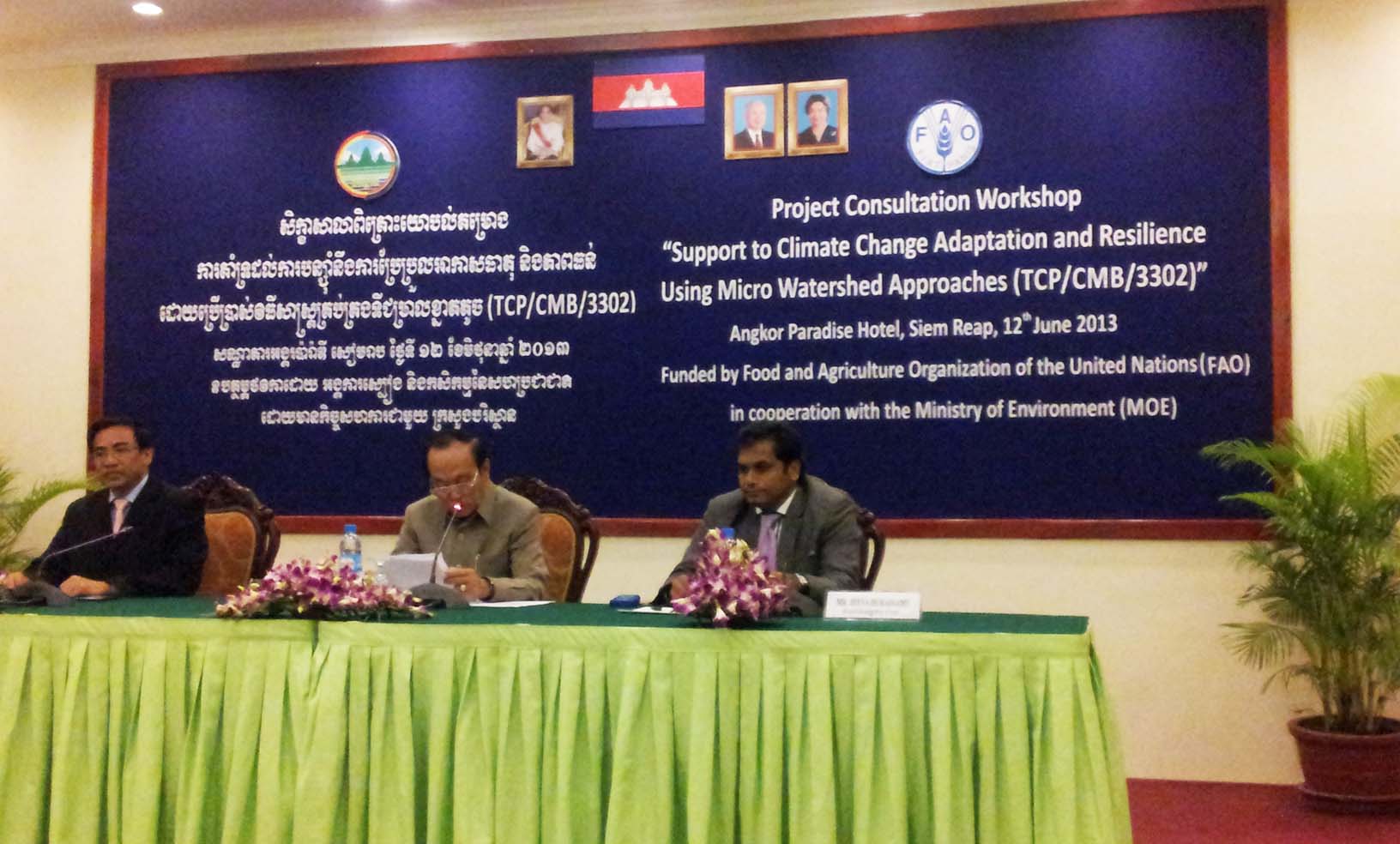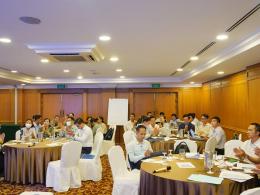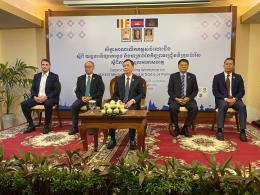 The Ministry of Environment (MoE), with technical cooperation programme (TCP) funding from Food and Agriculture Organization of the United Nations (UNFAO), organised a Participatory Rural Appraisal training and Project Consultation meeting in Siem Reap from 3-10 June 2013 under the project “Support to Climate Change Adaptation and Resilience Using Micro-watershed Approaches.” MoE signed two-year TCP project agreement with FAO in 2012 to build national capacity and endorsed the high priority development of climate change adaptation, identified under the National Adaptation Programme of Action to Climate Change (NAPA), in order to mobilize resources from the Least Developed Country Fund (LDCF) to support Cambodia.
The Ministry of Environment (MoE), with technical cooperation programme (TCP) funding from Food and Agriculture Organization of the United Nations (UNFAO), organised a Participatory Rural Appraisal training and Project Consultation meeting in Siem Reap from 3-10 June 2013 under the project “Support to Climate Change Adaptation and Resilience Using Micro-watershed Approaches.” MoE signed two-year TCP project agreement with FAO in 2012 to build national capacity and endorsed the high priority development of climate change adaptation, identified under the National Adaptation Programme of Action to Climate Change (NAPA), in order to mobilize resources from the Least Developed Country Fund (LDCF) to support Cambodia.
FAO has formulated the full project titled "Strengthening the Adaptive Capacity and Resilience of Rural Communities Using Micro-watershed Approaches to Climate Change and Variability to Attain Sustainable Food Security in Cambodia." The total value of the project is 5.6 million USD and will be implemented over five years. The four pilot micro-watersheds selected for demonstration and training are the Lvea Krang commune, Varin District, Siem Reap; PoPok commune, Stoung District, Kampong Thom; Kulen Chheung commune, Kulen District, Preah Vihear; and Ta Veaeng Leu commune, Ta Veaeng District, Ratanakiri; covering over 60,000 hectares and directly benefiting approximately 10,000 people.
MoE organised the first on-farm participatory rural appraisal (PRA) training for project baseline development from 3-10June 2013 in Lvea Krang commune, Varin District, Siem Reap. A total of 17trainees from MoE; Ministry of Agriculture, Forestry, and Fisheries (MAFF); Ministry of Women’s Affairs (MoWA); and three key universities participated in the development exercises. The district Governor hosted the team and all participants stayed one week in the village with the local communities to learn more about their livelihoods. Over 300 villagers from 3 villages participated and shared information during the documentationprocess on a wide range of community activities. The PRA draft results were presented to the villagers on the final day.
As a follow up to this meeting, MoE arranged an exposure visit for high ranking officials to the Lvea Krang commune pilot site in order to familiarise themselves with the concepts of micro-watershed management and ecosystems approach. The project consultation workshop was held on the 12June 2013, with FAO officershighlightinga rangeof climate change impacts and inherent challenges from the global to local scale, focusing on Cambodia. In his opening remarks H.E. Thuk Kroeun Vutha, Secretary of State, Ministry of Environment, reminded the participants about the impacts of climate change citing various examples of frequenting extreme weather events such as floods, droughts and windstorms which are impacting the development progress, and the proactive actions taken by the Royal Government of Cambodia to adapt to climate change and achieve resilience.Four FAO experts presented information on thefour components of the project, including: (1) Integrating climate change adaptation into agricultural and food security polices, (2) Demonstrating participatory integrated micro-watershed management approaches, (3) Promoting climate resilient agricultural practices, and (4) Piloting sustainable climate resilient gender-balanced alternativelivelihood options.
FAO technical officers also offered a number of opportunitiesand potential solutions to challenges encountered while implementing the project. The utilization of innovative technologies such as advanced remote sensing for climate change vulnerability assessments;development of software for enhancing access of climate, crop, and market data; and enhanced communication abilities with technicians using tablets and smart phones, were all presented as viable options. Policy decisions and governmental understanding could be enhanced with improved science-based climate change approaches to downscaling climate information for decision makers; improving and enlarging university climate change curriculums; and integrating the forestry, water, soil and agriculture sectors to improve watershed management. In terms of the agricultural sector, the introduction of climate resilient crop varieties, cropdiversification, improved crop productivity, and theinvolvement of women can benefit the capacity to adapt to climate change. FAO has proposed hands-on training approaches to transfer, test, validate and adopt these technologies and frameworks. The second session of the consultation involved the participants working in groups to familiarize themselves with the project work plan and provide comments and inputs for improvement.
MoE will organize further PRA trainings in other pilot sites to further train and enhance the capabilities of the national staff.The results will be used to set up the participatory baseline indicators for the project and to finalize the work plan during the LDCF project inception.



